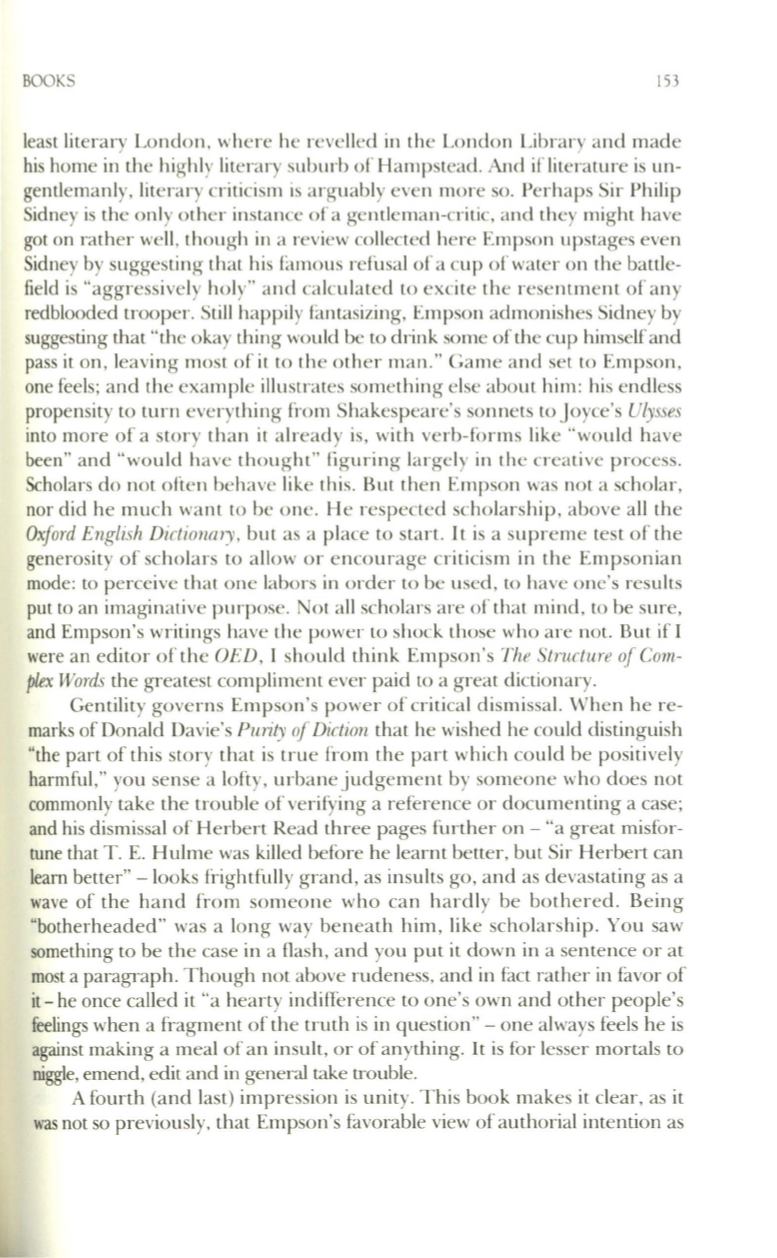
BOOKS
IS3
least literary London, where he revelled in the London Library and made
his home in the highly literary suburb of Hampstead. And if literature is un–
gentlemanly, literary criticism is arguably even more so. Perhaps Sir Philip
Sidney is the only other instance of a gentleman-critic, and they might have
got on rather well, though in a review collected here Empson upstages even
Sidney by suggesting that his famous refusal of a cup of water on the battle–
field is "aggressively holy" and calculated to excite the resentment of any
redblooded trooper. Still happily fantasizing, Empson admonishes Sidney by
suggesting that "the okay thing would be to drink some of the cup himself and
pass it on, leaving most of it to the other man." Game and set to Empson,
one feels; and the example illustrates something else about him: his endless
propensity to turn everything from Shakespeare's sonnets to Joyce's
Ulysses
into more of a story than it already is, with verb-forms like "would have
been" and "would have thought" figuring largely in the creative process.
Scholars do not often behave like this. But then Empson was not a scholar,
nor did he much want to be one. He respected scholarship, above all the
Oxford English DictiouaTY,
but as a place to start. It is a supreme test of the
generosity of scholars to allow or encourage criticism in the Empsonian
mode: to perceive that one labors in order to be used, to have one's results
put
to
an imaginative purpose. Not all scholars are of that mind,
to
be sure,
and Empson's writings have the puwer
to
shock thuse who are not. But if I
were an editor of the
OED,
I should think Empson's
The Structure oJCom–
plex
Words
the greatest compliment ever paid
to
a great dictionary.
Gentility governs Empson's power of critical dismissal. When he re–
marks of Donald Davie's
Purity oj Diction
that he wished he could distinguish
"the part of this story that is true £i-om the part which could be positively
harmful," you sense a lofty, urbane judgement by someone who does not
commonly take the trouble of verifying a reference or documenting a case;
and his dismissal of Herbert Read three pages further on - "a great misfor–
tune that
T.
E. Hulme was killed before he learnt better, but Sir Herbert can
learn better" - looks frightfi.lily grand, as insults go, and as devastating as a
wave of the hand from someone who can hardly be bothered. Being
"botherheaded" was a long way beneath him, like scholarship. You saw
something to be the case in a nash, and you put it down in a sentence or at
most a paragraph. Though not above rudeness, and in fact rather in favor of
it- he once called it "a hearty indifIerence
to
one's own and other people's
feelings when a fragment of the truth is in question" - one always feels he is
against making a meal of an insult, or of anything. It is for lesser mortals to
niggle, emend, edit and in general take trouble.
A fourth (and last) impression is unity. This book makes it clear, as it
was not so previously, that Empson's favorable view of authorial intention as


